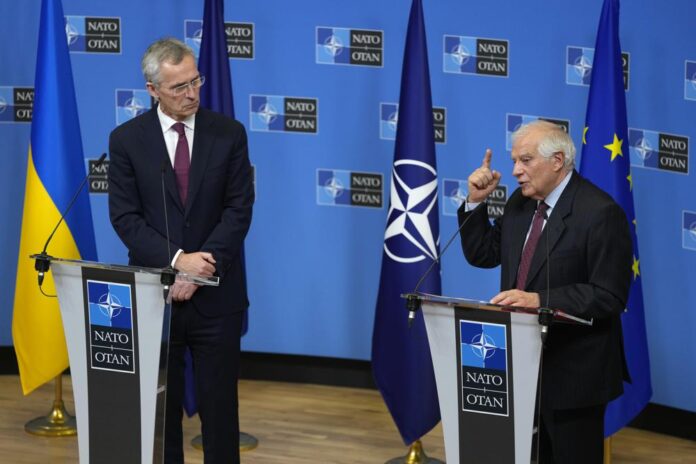The European Union on Tuesday urged its member countries to provide more ammunition to Ukraine from their stockpiles and from any orders that they might have already placed with the defense industry to help defeat invading Russian forces, according to AP News.
According to some estimates, Ukraine is firing up to 6,000-7,000 artillery shells daily — about the same amount that a small European country orders in a peace-time year — but this is only around a third of the number of rounds that Russia is using, one year into the war.
“We have to act with a sense of urgency,” EU foreign policy chief Josep Borrell told reporters at NATO headquarters in Brussels. Borrell said that he had written to the bloc’s 27 defense ministers urging them to “give Ukraine priority” when it comes to weapons and ammunition.
“What we have to do is measured in weeks, not in months,” he added.
Ukrainian President Volodymyr Zelenskyy has appealed to his Western allies to quicken their military support, warning that delays would play into Russia’s hand as the invasion approaches its anniversary on February 24.
Debate at the EU has been focused on ways to make joint purchases of ammunition and use a special joint fund to provide extra financing. However, the defense industry requires solid, long-term orders to stand up and expand production lines and cannot simply ramp up supplies overnight.
Speaking at a news conference with Borrell and Ukrainian Foreign Minister Dmytro Kuleba, NATO Secretary-General Jens Stoltenberg said the world’s biggest security organization will set up a scheme to help Ukraine get the supplies that it needs.
“We have agreed that NATO should assist Ukraine to develop a procurement system that is effective, transparent and accountable,” Stoltenberg said. He said a panel of experts would meet soon to discuss how best to proceed.
“Key capabilities must reach Ukraine before Russia can seize the momentum,” he said.
NATO believes that Russia has launched a long-anticipated offensive in recent weeks, raising the intensity of attacks in eastern Ukraine while building up forces in the south. Officials have said that Ukraine is likely to launch its own counteroffensive in the spring.
NATO and the EU have been aware of the likelihood of shortfalls for several months. Asked whether he thinks that Ukraine’s Western partners are acting quickly enough, Kuleba said that “not enough has been done and this is why we’re standing here.”
Estonia, which shares a border and long history with Russia, is driving the EU and its NATO allies to provide 1 million artillery shells, at an estimated cost of 4 billion euros.


